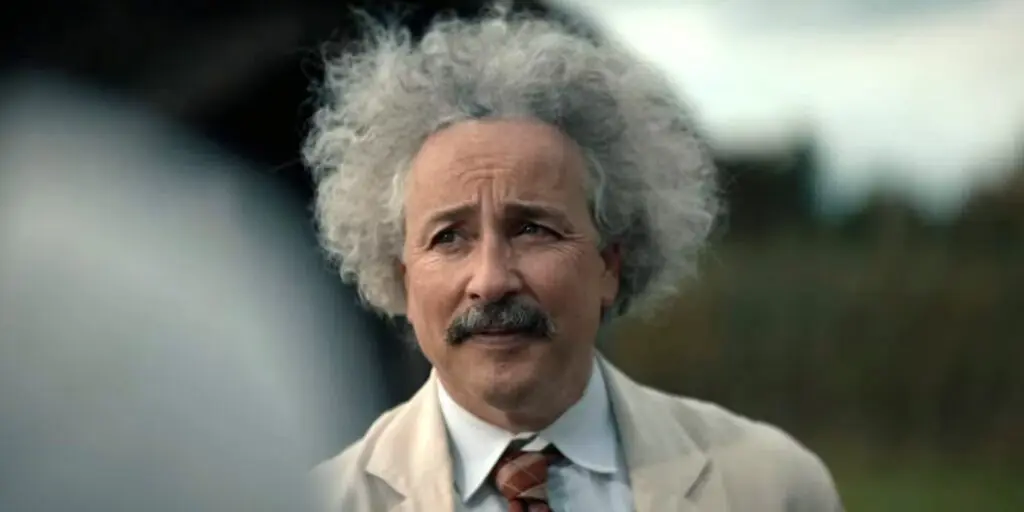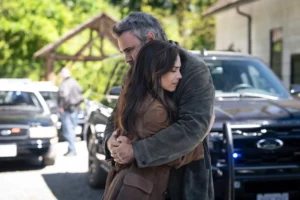Netflix’s documentary Einstein and the Bomb seeks to take advantage of the recent uptick in interest in the making of the atomic bomb, telling the story of one of the most well-known physicists and his relationship to it. However, the ending of the documentary reiterates that Einstein’s contributions to the development of the most terrifying weapon humanity has created were minimal and that ultimately he remained a pacifist, throwing the movie’s title and premise into question.
While this documentary attempts to take a unique approach to preserve as much of the truth as possible, the hour-and-a-half documentary fails to fulfill the promise of its title, rarely spending much time on the titular bomb. J. Robert Oppenheimer’s name isn’t even mentioned once, a surprising omission given that the pair were friends.
What was Einstein’s contribution to the atomic bomb?
Toward the end of the documentary, Einstein is confronted by a Japanese journalist, Katsu Hara, demanding to know how Einstein felt about his role in the creation of the atomic bomb and the destruction of cities. Einstein’s response to this is to say that in 1905 when he first published the recognisable formula E = mc2 along with the idea mass can be converted into energy, the idea that someone would use it to create weapons of mass destruction was inconceivable at the time, and he can’t be to blame for providing a piece of the jigsaw that helped invent the nuclear bomb.
The other thing Einstein replies with is that if he knew the Germans weren’t going to be able to make an atomic bomb themselves, then he wouldn’t have lobbied the US government so hard to fund similar scientific initiatives in the United States. Because Einstein thought that organized force was the only thing that could defeat organized force, he must have thought that the only way to defeat a nuclear Germany would have been with a nuclear-armed United States. Of course, Germany never made a nuclear bomb during the war, and their defeat came before the USA could use their nuclear bomb on Germany.
In real life, this exchange didn’t happen quite like this. Katsu Hara sent his words by letter, and Einstein also responded to them by letter, saying that he felt compelled to push for the development of the atomic bomb, but he remained a committed pacifist throughout. He expressed this regret in his letter, something that many of the physicists of the Manhattan Project showed as well.
Einstein was never a part of the Manhattan Project, so he never had direct involvement with any of the calculations or making the bomb. The US government believed that he would be a security risk to the program, a belief born due to Einstein’s pacifist beliefs. This continued after the Second World War, when during the Red Scare he was accused of being a Communist. Einstein was never a Communist.
How does Einstein and the Bomb end?
The final few minutes of the documentary see Einstein reflect on the role of science in society, where he comments that it was once seen as harmless, and is now something that makes people tremble with fear. It’s a fact that many scientists have to grapple with, that their work, though seemingly for the betterment of the human race, can be suddenly weaponized and used to inspire fear and cause death, which was realized more widely after the Second World War.
He goes on to say that science will never stop with its advances, and each discovery will only inspire new questions. No scientist should be condemned because their work is exploited for destructive purposes. Rather, the fate of mankind hinges on the moral ability of humanity, and their restraint not to use these weapons for destructive means. This means, in Einstein’s view, it’s not the fault of any scientist that they pursue any scientific discovery, but it’s up to the politicians to prevent their work from being weaponized.
Einstein remained a committed pacifist his whole life, praising other figures like Mahatma Gandhi. He died on April 18, 1955.
Who was Oliver Locker-Lampson?
Commander Oliver Locker-Lampson was a naval reserve officer and a Conservative Member of Parliament who was elected in 1910 until 1945. He met Einstein at a lecture in Oxford, and the pair exchanged letters. When Einstein went into exile, Locker-Lampson gave him a place to stay at Roughton Heath. He also offered secretaries with rifles to protect Einstein, in case the Germans came looking for him.
Andrew Havill plays the MP in the Netflix documentary, with the British pompousness expected for an MP of that time.
What did you think of the ending of Einstein and the Bomb? Comment below.
RELATED:




